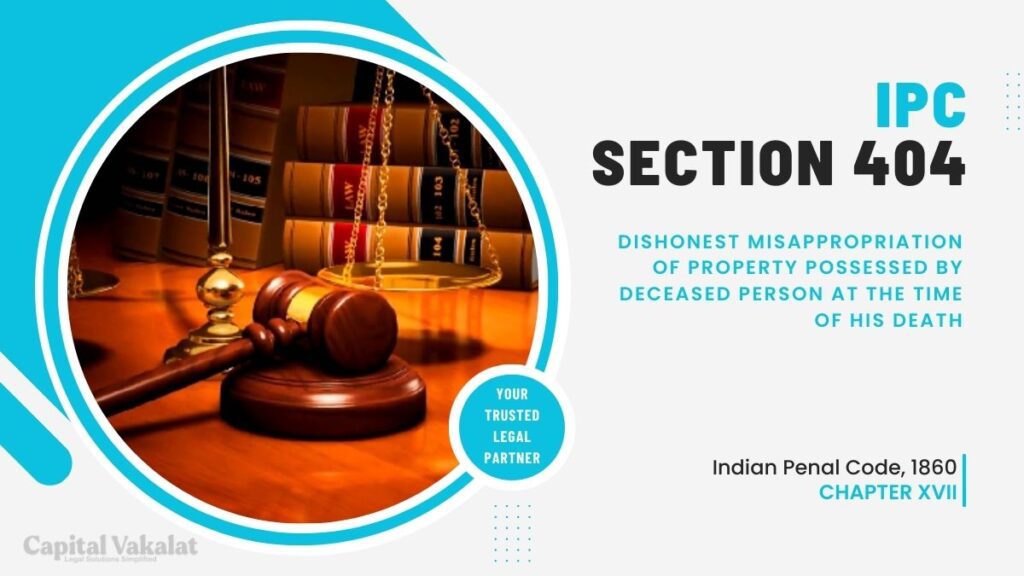In the vast realm of legal provisions, Section 404 of the Indian Penal Code (IPC) stands as a critical measure against the dishonest misappropriation of property that belonged to a deceased person at the time of their demise. This article delves into the intricacies of Section 404 IPC, exploring its historical evolution, the elements defining the offense, rights and liabilities of individuals involved, challenges in prosecution, case studies, prevention strategies, and its relevance in contemporary society.

Understanding the legal nuances of Section 404 IPC is crucial in comprehending the gravity of dishonest misappropriation concerning the property of deceased individuals. This provision plays a pivotal role in upholding justice and safeguarding the interests of rightful heirs and beneficiaries.
Understanding Section 404 IPC
Legal Definition and Elements of the Offense
Section 404 IPC addresses the act of dishonest misappropriation of property possessed by a deceased person at the time of their death. The offense involves intentional and wrongful appropriation, highlighting the importance of proving dishonesty in legal terms.
Key Aspects of Misappropriation in the Context of a Deceased Person’s Property
Navigating the legal landscape requires a nuanced understanding of misappropriation concerning the property of the deceased. This section explores the unique challenges and considerations associated with such cases.
Historical Perspective
Evolution of Section 404 IPC
Tracing the roots of Section 404 IPC unveils its evolution over time. Amendments and landmark cases have shaped the interpretation of this provision, contributing to its current form and application.
Landmark Cases Shaping its Interpretation
Examining notable legal cases provides insights into the judicial interpretation of Section 404 IPC, influencing subsequent judgments and reinforcing the importance of addressing dishonest misappropriation.
Elements of Dishonest Misappropriation
Explanation of ‘Dishonesty’ in Legal Terms
Central to Section 404 IPC is the element of ‘dishonesty.’ This section breaks down the legal definition, offering clarity on what constitutes dishonest misappropriation under the provision.
Illustrative Examples of Misappropriation Scenarios
Concrete examples elucidate the diverse scenarios that fall within the purview of Section 404 IPC, providing a practical understanding of the offense.
Rights and Liabilities
Rights of Legal Heirs and Beneficiaries
Understanding the rights of legal heirs and beneficiaries is essential in safeguarding their interests in cases of dishonest misappropriation. This section explores the legal entitlements of rightful claimants.
Liabilities of Individuals Involved in Dishonest Misappropriation
Individuals engaged in dishonest misappropriation face legal consequences. Delving into the liabilities associated with this offense sheds light on the accountability of those involved.
Challenges in Prosecution
Difficulties Faced in Proving Misappropriation
Prosecuting cases under Section 404 IPC comes with its set of challenges. This section examines the hurdles faced in establishing misappropriation and suggests potential solutions.
Legal Loopholes and Potential Improvements
Identifying loopholes in the legal framework enables a discussion on possible amendments and improvements to enhance the effectiveness of Section 404 IPC.
Case Studies
Real-Life Cases Highlighting Section 404 IPC
Analyzing real-life cases provides practical insights into the application and outcomes of Section 404 IPC. Case studies showcase the diversity of situations where the provision comes into play.
Outcomes and Impact on the Legal Landscape
Examining the outcomes of cases serves as a barometer for the provision’s efficacy and its influence on shaping legal precedents.
Prevention and Safeguards
Measures to Prevent Dishonest Misappropriation
Proactive measures can mitigate the risk of dishonest misappropriation. This section outlines strategies and safeguards to protect the property of deceased individuals.
Legal Tools and Mechanisms for Safeguarding Deceased Persons’ Property
The legal system provides tools and mechanisms to fortify the protection of deceased persons’ property. Understanding these resources is crucial for effective prevention.
Relevance in Contemporary Society
Addressing Modern Challenges with Section 404 IPC
As societal structures evolve, Section 404 IPC must adapt to address modern challenges. This section explores the relevance of the provision in contemporary legal scenarios.
Adaptations and Amendments Needed for Evolving Scenarios
Considering the dynamic nature of legal landscapes, this section suggests potential adaptations and amendments to ensure Section 404 IPC remains a robust instrument in combating dishonest misappropriation.
Conclusion
In conclusion, Section 404 IPC stands as a formidable safeguard against the dishonest misappropriation of property belonging to deceased individuals. The article has navigated through its historical evolution, legal elements, challenges, and case studies, highlighting the provision’s relevance and the need for awareness and compliance.
Frequently Asked Questions
What distinguishes ‘dishonesty’ in the context of misappropriation under Section 404 IPC?
‘Dishonesty’ involves intentional and wrongful actions leading to misappropriation, emphasizing the culpable mental state of the offender.
How can legal heirs protect themselves from potential misappropriation?
Legal heirs can take preventive measures, such as creating a comprehensive will, appointing trustworthy executors, and staying informed about their rights.
What challenges do prosecutors commonly face in cases under Section 404 IPC?
Prosecutors often grapple with proving dishonest intent and establishing a clear link between the accused and the misappropriation, presenting common challenges in such cases.
Are there proposed amendments to enhance the effectiveness of Section 404 IPC?
Discussions on potential amendments are ongoing, aiming to address emerging challenges and ensure the provision remains robust in contemporary legal landscapes.